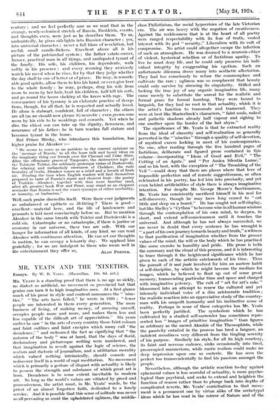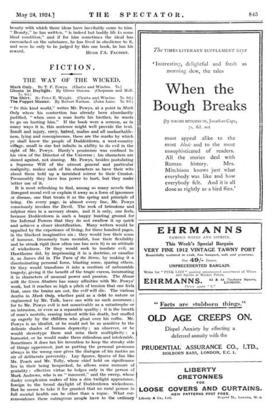MR. YEATS AND THE 'NINETIES.
Essays. By W. B. Yeats. (Macmillan. 10s. 6d. net.)
MR. YEATs is a standing proof that there is no age so sickly, no dialect so artificial, no movement so provincial but that genius can turn it to high imaginative uses. At a first glance much of his prose in style and content announces the "'nine- ties." "The arts have failed," he wrote in 1901 ; "fewer people are interested in them every generation. The mere business of living, Of making money, _of _ amusing oneself, occupies people more and more, and makes them less and less capable of the difficult art of appreciation." Six years earlier he saw "in the arts of every country those faint colours and faint outlines and faint energies which many call 'the decadence,'" and welcomed the fact as signifying that "the autumn of the body" was at hand, that the days of florid, declamatory and picturesque writing were numbered, and that imagination in revolt against the logic of science, the realism and rhetoric of journalism, and a utilitarian morality which valued nothing intrinsically, should console and rediscover itself in a world of rapt meditation. No movement which is primarily a gesture of disgust with actuality is likely to possess the strength and substance of which great art is born. Decadence is to some extent inevitable to modern art. So long as the world's values are vitiated by greed and possessiveness, the artist must, in Mr. Yeats' words, be the priest of an almost forgotten faith, dedicated to a lonely service. And it is possible that this sense of solitude was never so all pervading as amid the upholstered ugliness, the middle-
class Philistinism, the social hypocrisies of the late Victorian era. The air was heavy with the negation of creativeness. Against the recklessness that is at the heart of all poetry were ranged respectability with its fear of truth, vested interest with its god "security," Liberalism with its cult of compromise. No artist could altogether escape the infection of such an atmosphere. He was doomed to a neurosis either of violent, hysterical rebellion or of fastidious apathy. To live he must deny life, and he could only preserve his indi- vidual integrity by exaggerating his egotism. Such an unfortunate dilemma drove many into aesthetic affectation. They had too consciously to refuse the commonplace and cultivate the rare ; ugliness was so complacent that beauty &add only survive by stressing its singularity. Stifled and lacking the true joy of any organic imaginative life, many. came merely to substitute the unreal for the realistic and formal grace for formal humbug. They were bound to languish, for they had no root in that actuality, which it is the artist's function to transmute and transcend. They were at best like Maeterlinck's characters, "faint souls, naked and pathetic shadows already half vapour and sighing to one another upon the border of the last abyss."
The significance of Mr. Yeats is that he extracted reality from the ideal of sincerity and self-realization so generally perverted in the "nineties" through a quality of self-devotion, of mystical excess lacking in most of his contemporaries. No one, after reading through the five hundred pages ,of fastidious, deliberate and figured prose contained in this volume—incori)orating " Ideas. Of Good and Evil," "The Cutting of an Agate," and "Per Arnica Silentia Luna," and so his best, with the exception of" The Trembling of the Veil "—could deny that there are places where that love of impossible perfection and of remote suggestiveness, so often celebrated in his poetry, has led him into preciosity, and yet even behind artificialities of style there is always imaginative intention. For despite Mr. George Moore's facetiousness, Mr. Yeats has consistently sacrificed himself in his zeal for self-discovery, though he may have long ceased to "eat little and sleep on a board." He has sought not self-display, but like Shelley's "Cythna "to become wise in all human wisdom _ through the contemplation of his own mind, to deepen, in short, and extend self-consciousness until it touches the universal. And although he has not always succeeded, we are never in doubt that every sentence he has wrought is "apart of his own journey towards beauty and truth," a witness to that purification of imagination whether from the grosser values of the mind, the will or the body which he has practised like some eremite In humility and pride. His prose is both the summary and the ritual of this process, and it is interesting to trace through it the heightened significance which he has given to each of the artistic catchwords of his time. Thus the pursuit of le mot juste involved for him an austere habit of self-discipline, by which he might become the medium for images, which he believed to float up out of some great memory, transcending particular time and space and charged with imaginative potency. The cult of "art for art's sake" blossomed into an attempt to renew the cultured and yet intensely individual voice of a dim aristocratic tradition ; the realistic reaction into an appreciative study of the country- man with his unspoilt humanity and his instinctive sense of reality. Perhaps in none of these categories has Mr. Yeats been perfectly justified. The symbolism which he has cultivated by a studied self-surrender has sometimes repre- sented less "images of primitive imagination" than figures as arbitrary as the sacred Akashic of the Theosophists, while the passivity entailed in the process has bred a languor, an indolent moodiness very different from the tingling serenity of his purpose. Similarly his style, for all its high courtesy,. its faint and nervous cadence, sinks occasionally into tired, preoccupied mannerisms, while rustic realism could make no deep impression upon one so esoteric. He has seen the perfect too transcendentally to find his passions amongst the people.
Nevertheless, although the artistic reaction to-day against ephemeral values is less scornful of actuality, is more psycho- logical than psychical, and seeks to extend and heighten the function of reason rather than to plunge back into depths of complicated reverie, Mr. Yeats' contribution to that move- ment is a permanent one by virtue alike of the archetypal ideas which he has read in the mirror of Nature and of the beauty with which those ideas have inevitably come to him. "Beauty)" he has written, "is indeed but bodily life in some ideal condition," and if for him sometimes the ideal has encroached on the substance, he has lived in obedience to it, and were he only to be judged by this one book, he has his
reward. HUGH I'A. FAUSSET.











































 Previous page
Previous page